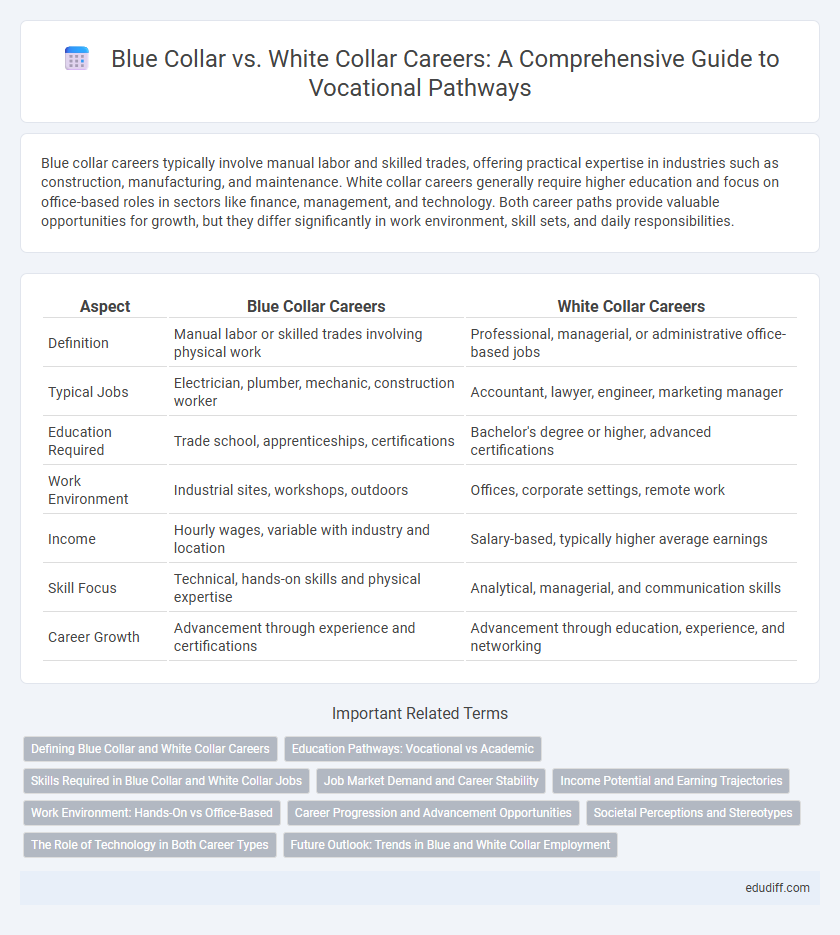Blue collar careers typically involve manual labor and skilled trades, offering practical expertise in industries such as construction, manufacturing, and maintenance. White collar careers generally require higher education and focus on office-based roles in sectors like finance, management, and technology. Both career paths provide valuable opportunities for growth, but they differ significantly in work environment, skill sets, and daily responsibilities.
Table of Comparison
| Aspect | Blue Collar Careers | White Collar Careers |
|---|---|---|
| Definition | Manual labor or skilled trades involving physical work | Professional, managerial, or administrative office-based jobs |
| Typical Jobs | Electrician, plumber, mechanic, construction worker | Accountant, lawyer, engineer, marketing manager |
| Education Required | Trade school, apprenticeships, certifications | Bachelor's degree or higher, advanced certifications |
| Work Environment | Industrial sites, workshops, outdoors | Offices, corporate settings, remote work |
| Income | Hourly wages, variable with industry and location | Salary-based, typically higher average earnings |
| Skill Focus | Technical, hands-on skills and physical expertise | Analytical, managerial, and communication skills |
| Career Growth | Advancement through experience and certifications | Advancement through education, experience, and networking |
Defining Blue Collar and White Collar Careers
Blue collar careers typically involve manual labor and skilled trades such as construction, manufacturing, and maintenance, emphasizing physical tasks and hands-on expertise. White collar careers primarily consist of office-based, professional, and administrative work, including roles in management, finance, and information technology. These distinctions highlight differences in work environment, required skill sets, and typical education pathways between the two career categories.
Education Pathways: Vocational vs Academic
Vocational education pathways focus on hands-on training and technical skills development tailored for blue collar careers such as electricians, plumbers, and machinists, emphasizing certifications, apprenticeships, and community college programs. In contrast, white collar careers in fields like finance, law, and engineering typically require academic education through four-year universities, offering bachelor's degrees and advanced academic qualifications. Both pathways play crucial roles in career readiness, with vocational training providing practical experience and academic routes delivering theoretical knowledge and broader career options.
Skills Required in Blue Collar and White Collar Jobs
Blue collar careers demand practical, hands-on skills such as manual dexterity, technical proficiency, and physical stamina, often acquired through apprenticeships or vocational training. White collar jobs prioritize analytical thinking, communication, and computer literacy, requiring formal education and specialized knowledge in fields like finance, law, or management. Both career paths emphasize problem-solving abilities but differ significantly in their skill sets and work environments.
Job Market Demand and Career Stability
Blue collar careers in manufacturing, construction, and skilled trades show strong job market demand due to ongoing infrastructure projects and aging workforce retirements. White collar careers in finance, technology, and healthcare offer career stability enhanced by continuous innovation and remote work trends. Both sectors present robust employment opportunities, but blue collar roles often provide faster entry and consistent demand in local economies.
Income Potential and Earning Trajectories
Blue collar careers often offer steady income with opportunities for overtime pay and performance-based bonuses, resulting in a stable earning trajectory that can increase significantly with skilled trades certifications. White collar careers typically start with higher base salaries and demonstrate more rapid income growth through promotions, advanced degrees, and managerial roles. Both career paths show strong income potential, but blue collar jobs provide earlier financial gains, while white collar careers offer long-term salary escalation linked to educational attainment and executive responsibilities.
Work Environment: Hands-On vs Office-Based
Blue collar careers typically involve hands-on work in environments such as construction sites, factories, or workshops where physical labor and technical skills are essential. White collar careers primarily take place in office settings, emphasizing administrative, managerial, or professional tasks performed at desks. The work environment for blue collar jobs often requires manual dexterity and physical stamina, whereas white collar roles demand cognitive skills and computer proficiency.
Career Progression and Advancement Opportunities
Blue collar careers typically offer hands-on skill development with advancement often tied to years of experience, certifications, and union involvement. White collar careers generally provide clearer pathways for progression through formal education, managerial training, and corporate leadership programs. Both career types present unique opportunities for growth, with blue collar roles emphasizing technical expertise and white collar roles focusing on strategic and administrative skills.
Societal Perceptions and Stereotypes
Blue collar careers are often perceived as physically demanding jobs associated with manual labor, frequently stereotyped as requiring less education and offering lower social status compared to white collar careers, which are linked to office work, higher education, and professional roles. Societal perceptions tend to undervalue the skill and expertise involved in trades such as plumbing, electrical work, and construction, despite their essential role in the economy and steady employment opportunities. These stereotypes influence career choices and contribute to wage disparities, workforce diversity challenges, and misconceptions about job prestige in vocational education and labor markets.
The Role of Technology in Both Career Types
Technology increasingly shapes both blue collar and white collar careers, enhancing efficiency and skill requirements. In blue collar jobs, automation and advanced machinery improve productivity but demand technical expertise for operation and maintenance. White collar careers leverage digital tools and software for data analysis, communication, and decision-making, emphasizing continuous tech literacy development.
Future Outlook: Trends in Blue and White Collar Employment
Blue collar careers in skilled trades such as electricians, plumbers, and HVAC technicians are experiencing steady growth due to increasing demand for infrastructure maintenance and renewable energy projects. White collar employment in technology, finance, and healthcare sectors continues to expand, driven by digital transformation and aging populations. Automation impacts both sectors differently; manual labor faces robotics competition, while white collar roles evolve toward data analysis and AI integration.
Blue Collar Careers vs White Collar Careers Infographic

 edudiff.com
edudiff.com